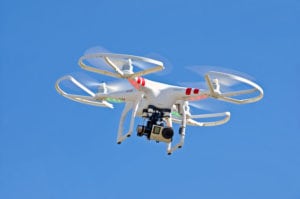
38096715 – white drone hovering in bright blue sky
b. A person commits a disorderly persons offense if he knowingly operates an unmanned aircraft system or uses an unmanned aircraft system to take or assist in the taking of wildlife.
c. A person commits a disorderly persons offense if he operates an unmanned aircraft system while under the influence of intoxicating liquor, a narcotic, hallucinogenic, or habit-producing drug or with a blood alcohol concentration of 0.08% or more by weight of alcohol in the defendant’s blood.
d. It shall be a violation of any restraining order issued by the court, or any other court order restraining contact with a person or location, for a person subject to that order to knowingly operate an unmanned aircraft system to fly within a distance of a person or location that would violate that restraining order.
e. Notwithstanding the provisions of N.J.S.2C:1-8 or any other law to the contrary, a conviction under this section shall not merge with a conviction of harassment pursuant to N.J.S.2C:33-4, stalking pursuant to 2C:12-10, invasion of privacy pursuant to 2C:14-9, obstructing administration of law or other governmental function pursuant to N.J.S.2C:29-1, introducing contraband pursuant to N.J.S.2C:29-6, contempt of a domestic violence order pursuant to subsection b. of N.J.S.2C:29-9 which constitutes a crime or disorderly persons offense, or any other criminal offense, even if any other conviction involves the use of an unmanned aircraft system, nor shall the other conviction merge with a conviction under this section.
A potential loophole in the text of the bill is that it prohibits domestic violence offenders from operating a drone within a distance of a protected person that the offender themselves could not occupy. However, many drones can come equipped with cameras and zoom lenses that would allow an operator to capture close-up images of protected persons while still remaining hundreds or thousands of yards away.
Lastly, N.J.S.A. 2C:43-6.4, concerning registered sex offenders and lifetime parole supervision, is amended to address the use of drones by registered sex offenders:
g. The special sentence of parole supervision for life required by this section may include reasonable conditions prohibiting or restricting the person’s operation of an unmanned aircraft system to reduce the likelihood of a recurrence of criminal or delinquent behavior.
